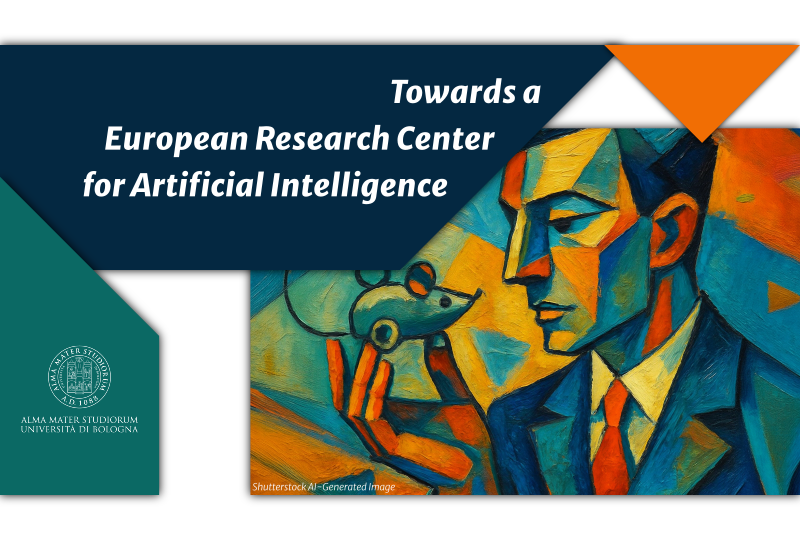
A Manifesto for European Research Center for AI
The Manifesto
Artificial Intelligence (AI) is transforming science, technology, society, and culture. Europe must not merely adapt to this transformation but actively shape it according to human values as well as match the state-of-the-art elsewhere to stay economically and politically resilient if AI capabilities continue to grow. We propose the creation of a European Research Center for Artificial Intelligence: a scientific initiative founded on human capital and long-term vision, grounded in theoretical depth, safety and ethics at its core, equipped with a steadily growing endowment of computing power, and designed to interact dynamically with start-ups and industries.
The Center will be founded on the following principles:
1. The Scientific Core — Prioritize foundational research to understand AI’s mechanisms along with its potential but also its, risks and their mitigation. This will provide the conceptual frameworks that enable innovation for the benefit of all, much as thermodynamics empowered the steam engine two centuries ago.
Explore, experimentally and theoretically, new directions of AI and new models. Examples could include systems that reason or self-improve, how to design AI that will not harm people or cross moral red lines, either because of user instructions or of its own accord, multimodal models aiming at creating representations of the world, new generations of large language models, less greedy in terms of compute and data.
Create the conditions for the development of applications, also in partnership with the private sector, with the understanding that trustworthiness of AI systems is a necessary precondition for successful adoption.
2. Human Capital First — Invest in people, creating an environment for top researchers and engineers to work with intellectual freedom and purpose. A compact core of permanent staff will be complemented by medium-term fellowships and a rotating network of visiting scientists, a human capital ranging from doctoral students to senior scientists.
3. Interdisciplinary Teams — The Center will bring together scientists from various disciplines, software developers, and large system builders who will work side by side, contributing different but complementary skills to a common scientific and humanistic endeavor.
4. Attracting Top Talent to Europe — The Center will offer competitive conditions, long-term support, and freedom to pursue ambitious ideas, with access to excellent students, modern infrastructures, a dedicated access to high-level computers, and a supportive administration. Its interdisciplinary setting will create the intellectual energy needed to attract and retain world-class researchers in Europe.
5. Alternative Competitive Path — Foster the conditions for small to medium visionary teams to achieve high-impact competitive results, developing efficient models that build on Europe’s areas of excellence, such as multilingual language technologies, robotics, healthcare and biomedical research, climate and environmental modeling, safe and ethical development and privacy-preserving AI, just to mention a few. These efforts will be supported by trusted datasets, reproducible training pipelines, and shared capability and risk evaluation standards.
6. Institutional Independence and Governance — Guarantee scientific independence through transparent governance: a non-profit legal form, a Governing Board which includes representatives of the stakeholders as well as of the scientific community, rotating leadership, and an independent Scientific Advisory Board. Ensure open calls and merit-based selection, strict conflict-of-interest rules, and freedom to publish. A diversified funding base will safeguard the Center’s scientific independence.
7. Technology Hub and Partner Foundation — Establish a dedicated structure to connect research with industry and society: a Technology Hub/Partner Foundation that manages collaborative projects, rapid prototyping, and joint IP frameworks; supports startup creation and growth; organizes the conditions for knowledge, code, and data transfer both for AI researchers and for companies, and shields early-stage ventures from premature acquisition. Industry partnerships are encouraged but always balanced by public interest, ensuring resilient innovation ecosystems.
8. Sustainability and Energy Efficiency — Make energy efficiency a core research theme, addressing AI’s environmental impact and pioneering sustainable computational models.
9. Safe and Accessible Models and Public Benefit — Prioritize open-source development when it does not endanger the public, to ensure AI tools are available to researchers, institutions, companies, and citizens, strengthening democratic access and fostering innovation.
10. Global Openness with European Roots — Rooted in Europe’s scientific traditions of critical inquiry, collaboration, and rigor, cultivate alliances with leading research institutions in Europe and worldwide, promoting AI research as a bridge for peace and cooperation.
11. Operational Model — Follow a lean, high-impact model: small permanent staff, access and management of large-scale computer resources, strong technical support. The Center will develop strong collaborations with AI research centers in European countries and with European networks; it will also work with existing -or to be developed- European hardware infrastructures to avoid duplication and maximize efficiency. The endowment of computing facilities will grow in a modular way, combining resources already available in Europe with those of the Center. The Center will benefit from a physical hub where researchers can meet and collaborate. Its own computing resources will be strengthened through synergies between core and partner institutions.
12. Ethics and Societal Impact — Embed ethical reflection and societal impact assessment into the research agenda from the outset, anticipating social, economic, security and cultural consequences, and engaging with policymakers, civil society, and the public to align innovation with democratic values, human rights, and the public interest.
Call to Action
This is a decisive moment for Europe. The future of AI will be written somewhere; let it take root here, in the language of science, public interest, and shared responsibility. We urge institutions, researchers, and leaders from the public and private sectors to join forces now, contribute ideas and resources, and help shape the foundation of this Center. Together, we can ensure that artificial intelligence grows as a tool for knowledge, cooperation, and the public good.
Pierluigi Contucci University of Bologna
Giorgio Parisi Sapienza University of Rome
Elena Agliari Sapienza University of Rome
Yoshua Bengio University of Montreal
Silvio Pietro Angori Pininfarina
Marco Baity-Jesi ETH
Jean Barbier ICTP
Paolo Branchini Roma Tre & INFN
Michael Bronstein Deep Mind & University of Oxford
Francesco Camilli ICTP
Giuseppe De Pietro Pegaso University
Aurelienne Decelle Universidad Politécnica de Madrid
Federica Gerace University of Bologna
Sebastian Goldt SISSA
Alessandro Laio SISSA
Yann LeCun Courant Institute New York University
Stefano Leonardi Sapienza University of Rome
Bruno Loureiro ENS Paris
Luciano Maiani Sapienza University of Rome
Antoine Maillard INRIA & ENS Paris
Marc Mézard Bocconi
Emanuele Mingione University of Bologna
Valentina Ros LPTMS - CNRS & Paris-Saclay
Andrea Ripa Titular Bishop of Cerveteri
Gabriele Sicuro University of Bologna
Beatriz Seoane Universidad Politécnica de Madrid
Sara Solla Northwestern University
Pierfrancesco Urbani Université Paris-Saclay, CNRS, CEA, IPhT
Rodrigo Veiga University of Nottingham
Cédric Villani IHES
Petition on Change.org
-
Sign the Petition
Support the Manifesto by signing the online petition.
The roundtable "Towards a European Research Center for Artificial Intelligence"
16:00 - 19:00 / Sala VIII Centenario - Palazzo Poggi
The roundtable has been hosted in the Sala VIII Centenario, within Palazzo Poggi, at the University of Bologna. This high-level discussion will be chaired by Pierluigi Contucci and Giorgio Parisi, and will bring together distinguished leaders at the forefront of AI research, representing both academia and industry, including experts from major global companies shaping today’s most advanced AI models.
The roundtable will culminate in the drafting of a strategic proposal for the creation of a new European Research Center for Artificial Intelligence, with a strong emphasis on theoretical foundations. The goal is to guide and unify the European research effort in AI, fostering long-term scientific vision and excellence. The roundtable will be the opportunity to discuss the European strategic vision on AI in one of Europe’s oldest and most symbolic academic institutions.
